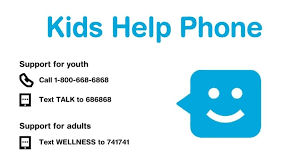Kids Help Phone/PREVNet
In accordance with our mandate to provide quality programs to help athletes at all levels to aspire to a healthy life, the UCSC swim club is pleased to provide information for the following two resources: Kids Help Phone and PREVNet.
 Kids Help Phone is Canada’s only free, national, bilingual, confidential and anonymous 24 hour phone and online counseling service for teens and kids. Kids Help Phone is recognized as a world leader in services and resources to improve the well-being of children and youth. Kids Help Phone makes these services and resources readily available to our athletes and their families.
Kids Help Phone is Canada’s only free, national, bilingual, confidential and anonymous 24 hour phone and online counseling service for teens and kids. Kids Help Phone is recognized as a world leader in services and resources to improve the well-being of children and youth. Kids Help Phone makes these services and resources readily available to our athletes and their families.
PREVNet is Canada's leading authority providing resources for dealing with and preventing bullying. Swimmers face many challenges in life, not all related to competing in their sport but also in managing their life and other responsibilities as well as navigating relationships with their peers, coaches, families and friends. UCSC is proud to provide members with easy access to professional assistance in times of need for issues ranging from bullying/cyber-bullying, to anxiety, depression, thoughts of suicide along with a host of other mental, emotional, and relationship health issues. Through PREVNet, UCSC is able to provide available resources, expertise and programming for its members to access help should the need arise. UCSC is committed to supporting healthy, lifelong development of each swimmer and Partnering with Kids Help Phone and PREVNet enables us to better achieve healthy and happy athletes and kids and youth.
Swimmers face many challenges in life, not all related to competing in their sport but also in managing their life and other responsibilities as well as navigating relationships with their peers, coaches, families and friends. UCSC is proud to provide members with easy access to professional assistance in times of need for issues ranging from bullying/cyber-bullying, to anxiety, depression, thoughts of suicide along with a host of other mental, emotional, and relationship health issues. Through PREVNet, UCSC is able to provide available resources, expertise and programming for its members to access help should the need arise. UCSC is committed to supporting healthy, lifelong development of each swimmer and Partnering with Kids Help Phone and PREVNet enables us to better achieve healthy and happy athletes and kids and youth.
Cyberbullying is a problem that arises when the technology that is supposed to bring people together is used instead to abuse others, pushing peers out of their social network into a world that is filled with loneliness, embarrassment, fear or shame.
If someone is using technology such as cell phones or computers or social media to intimidate or harass an individual, that person is being cyberbullied. Cyberbullying may include:
- Sending mean, threatening, nasty or insulting messages over the internet or cell phones (email, text messages, pictures etc)
- Sending or posting gossip, secrets or rumours
- Pretending to be someone else and sending negative messages or posting negative material
- Purposely excluding someone from an Internet group, chat room, instant messaging, email or friend list
- Harassing or threatening someone through instant messages (IMs) such as snapchat, Instagram, Facebook, text messages, or emails
- Posting private or embarrassing photos online without permission
- Starting a polling website where visitors are asked to rate someone’s appearance, popularity or attributes in a negative manner
- Taking an embarrassing photo of someone with a camera or phone and emailing that photo to others
- Engaging someone in instant messaging, tricking them into revealing personal information and then forwarding that information to others
- Verbally abusing other players in multiplayer online games, Internet-connected console games, and virtual worlds
- Creating fake social media accounts such as blogs or websites that have stories, cartoon, stories or pictures or jokes that ridicule someone
- Stealing someone’s password and then changing their profile to reflect sexual, racist and other content that may offend others
- Stealing someone’s password and then impersonating him or her online. Eg; breaking into an email account and sending hurtful materials to others under an assumed identity
- Spreading lies, gossip, rumours, secrets about another person online that damage a person’s reputation
Why do we care about Cyberbullying?
Cyberbullying can be very damaging emotionally, especially since children and teens often find it difficult to avoid phones and the Internet. Cyberbullying can happen anywhere, anytime — whenever a person is online or has their phone. And because of the anonymous nature of the Internet, certain forms of cyberbullying — like spreading abusive rumours — can happen quickly and discreetly, sometimes before the person being targeted even knows it’s happening.
How can I tell if someone is being cyberbullied?
May seem upset when online.
Avoid the computer or quickly turn off the computer when adults approach.
Seem reluctant to go to school or to their sport or social activities.
Appear withdrawn, anxious, or depressed.
What can I do to prevent the problems with cyberbullying ?
THINK BEFORE POSTING